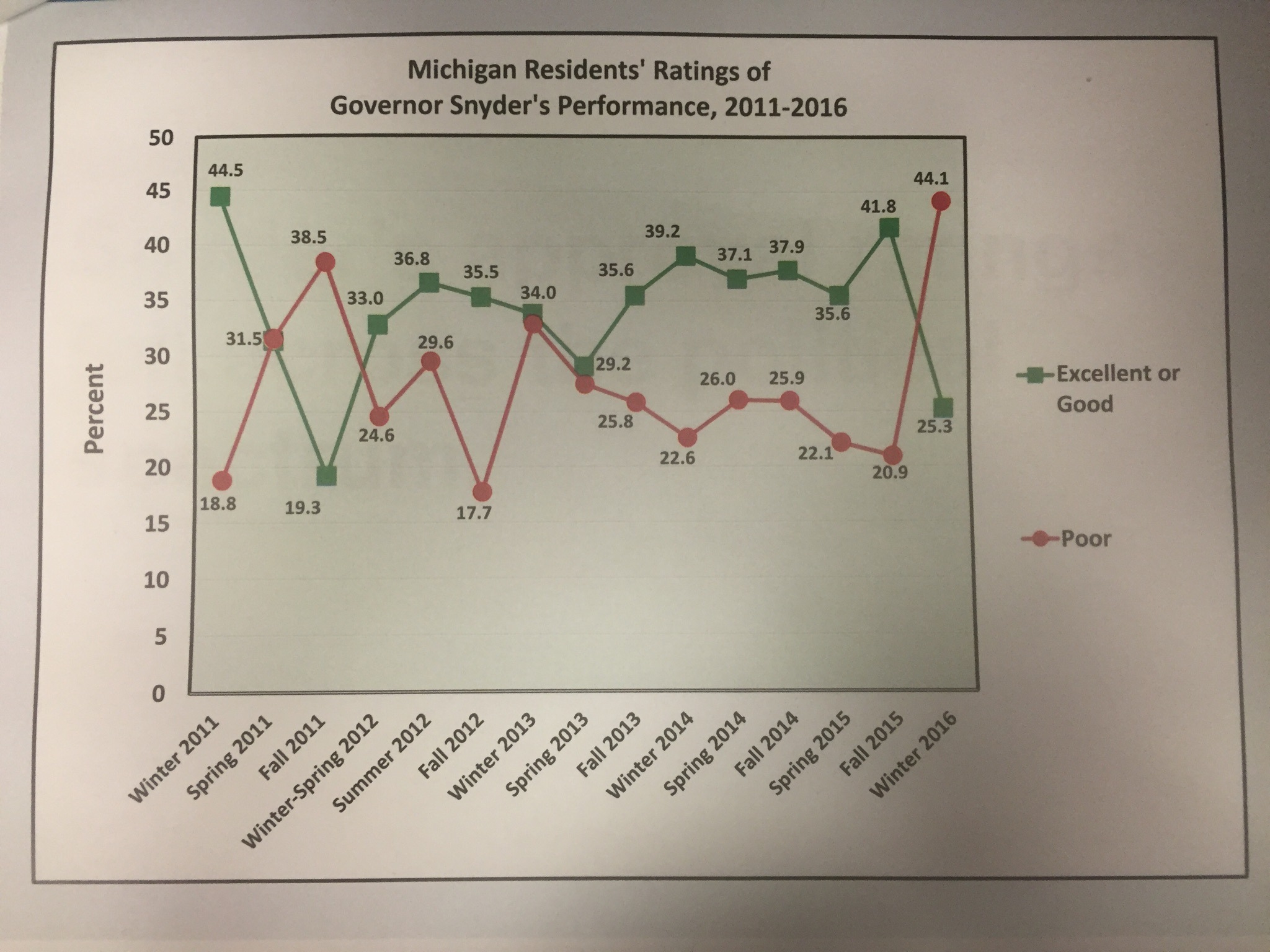The Flint Water Crisis Plumets Governor Synder's Ratings in the 2016 State of the State Survey
- Published: 4/18/2016
- Comments
LANSING - On Monday, April 18th, Director of Michigan State University's State of the State Survey (SOSS) Charles Ballard held a news conference where he presented results from Round 72 of the survey, which measured public opinion from January through March of this year.
The public was invited to join the news conference by phone or by phone and video. It was also broadcast over Zoom, a web conferencing software.
The majors questions that were addressed were: How Governor Rick Synder fares with Michigan residents since the discovery and public disclosure of the tainted drinking water in Flint? Who do Michigan residents believe is most responsible for high levels of lead discovered in the city's drinking water? How much trust do Michigan residents have in local, state and federal government?
There were 995 interviews completed in the SOSS Wave 72, from January 25, 2016 to March 26, 2016. Ballard discovered that four out of seven Michigan residents placed the main responsibility for the Flint water crisis on Governor Synder, his appointee Darnell Earley, or state government.
Michigan Residents' Opinions About Who is Most Responsible for the Flint Water Crisis:
1. Michigan Department of Environmental Quality: 26.3%
2. Governor Rick Synder: 19.9%
3. Everyone: 17.2%
4. Emergency Financial Manager Darnell Earley: 10.4%
5. State of Michigan (unspecified): 0.4%
*This only includes a few of the results and therefore does not add up to 100%.
Due to the Flint water crisis Governor Synder’s approval ratings fell sharply. He received a “poor” rating from 44.1% of respondents, up from the previous survey’s 20.9% in Fall 2015. This ranks as the largest fraction ever to give him a poor rating during his five-year tenure. It’s also the highest “poor” rating for a governor since summer 2010 when Jennifer Granholm was rated at 46%.
Synder’s approval ratings fell across the political spectrum as well. “Clearly, the Flint water crisis has done a lot of damage to Governor Synder’s approval ratings among Michigan residents,” Ballard said. “His ratings deteriorated across the board. His ratings of ‘excellent’ or ‘good’ fell by 14 percentage points among Republicans, 14 points among Democrats and 20 points among Independents.”
By contrast, President Barack Obama’s ratings have improved since the last SOSS. In Fall 2015 his “excellent/good” rating among Michigan residents was 38.7% compared to the Winter 2016 rating of 43.0%.
The survey measures trust in government as well and although Gov. Synder’s ratings fell substantially this did not correspond to a major loss in trust in the state government. “In fact, after a long period of decline, trust in all levels of government, local, state and federal, has shown a modest increase since 2012,” Ballard said.
The respondents who said they could trust state government “seldom” or “almost never” increased from 31% in 2015 to 36% om 2016. The fraction who said they could trust state government “nearly all or most of the time” also increased.
The SOSS also asked Michigan residents to pick the most important problem facing the governor and state Legislature.
For the first time, the Flint water crisis has brought infrastructure of cities (includes drinking water) to the top of the list of the most important problems facing Governor and Legislature at 32.5%. Jobs and economy has dominated the answers for about 15 years and is now in second at 24.4%.
Ballard says that there is no way to tell how this will affect the upcoming election, “We will just have to wait and see.”


 Spanish
Spanish Chinese (Simplified)
Chinese (Simplified) Korean
Korean French
French German
German Hindi
Hindi Urdu
Urdu Japenese
Japenese Arabic
Arabic Russian
Russian Farsi
Farsi
